





The opening of Derby Cathedral School in September 2018 was a special moment for Derby Diocesan Academy Trust. With over one hundred infant, primary, and junior Church Schools across the Diocese of Derby, it had always been a dream of ours to be able to offer young people the opportunity to continue their educational journey at secondary level. In addition to being our first secondary school where we are now able to complete this ‘all through journey’, Derby Cathedral School was the first Church of England secondary school to be established in Derbyshire. With pupils now ready to progress within our school to a Post 16 education, we were delighted to celebrate an additional milestone: the opening of Derby Cathedral School Sixth Form – September 2023.
‘experience life in all its fullness’
John 10:10
Our aim is for the Sixth Form to be inclusive, supporting progression of our own Year 11 students, as well as welcoming pupils from schools within Derbyshire. Our schools are not faith schools for the faithful, but where they are Church Schools, they are so for the community. We are excited to welcome you to join our community because your commitment and values align with ours. We want to encourage you to choose courses that will not only further your career ambitions but will inspire and motivate you while you are in our care. To support this, Derby Cathedral School Sixth Form offers a broad Level 3 curriculum, including both A Levels and vocational courses which allow students to follow bespoke pathways Post 16. Through the commitment of our subject specialists, we endeavour to offer the highest possible standards of teaching and learning in all subjects’. In addition to the rich extracurricular offer and strong links to Derby Cathedral, we engage with a wide range of Universities, Further Education providers and employers to ensure that when you leave us, you have an exciting future ahead.
We are immensely proud, honoured and privileged to be serving our students, and their families, who are about to walk through our doors. We look forward to meeting you.
Sarah Clark Chief Executive Officer DDAT

I offer you a very warm welcome to Derby Cathedral School’s Sixth Form that opened in September 2023. It is important for us that our Sixth Form reflects the strong vision and values we have for our school community but also is uniquely designed to support students at this important stage in their educational careers. Our students have played a key role in designing and shaping the development of our Sixth Form and we are proud of the hard work they have put in to establishing this provision.
Supporting young people to flourish is at the heart of our vision; over their two years of study, our sixth-form students will benefit from strong support in four key areas; their curriculum, community, career and culture. Developing each of these strands will ensure that they are able to ‘experience life in all its fullness’ (John 10:10) and make a smooth transition into their next step be that university, apprenticeship or employment. Our ambition is illustrated in the key Bible verse below chosen for our Sixth Form.
“For I know the plans I have for you,” declares the Lord, “plans to prosper you and not to harm you, plans to give you hope and a future.”
Jeremiah 29:11
Our curriculum offer reflects our high levels of aspiration for all and gives a good choice of subjects that support all future career pathways. As a Christian school and Sixth Form, our FAITH values also underpin all forms of personal development and our wider culture. We believe in educating the whole person and feel passionately that our sixth-form students are supported to become the leaders and role models of the future. Our sixth-form students will be expected to play a key role in developing themselves, as well as having plenty of opportunities to develop and support others in both our school and local community.
We are proud of our place in Derby city and understand the importance of developing and celebrating students of all backgrounds to be the best that they can be. Our sixth-form students experience the passion and commitment that we have for ensuring that all young people in our care are given the best education, with the best opportunities.
Please take some time to read through this prospectus: it contains all of the key information you need as well as offering a deeper insight into the ethos and foundations that have shaped our vision. We’re excited to be part of the next steps into your future and look foward to working with you.
If you do have any further questions, do not hesitate to get in touch.
Mrs J. Brown Headteacher

We are incredibly proud of our new Sixth Form which opened its doors for the first time in September 2023. It has been a privilege to have the rare opportunity to create a Sixth Form from the ground up and we continue to build on the strong foundations the whole school has set since opening in 2018. The development of the Sixth Form has been a natural progression to expand the whole school community, and we look forward to welcoming you to our ever-growing school.
Experienced, committed and driven, we will continue to ensure that the Sixth Form is a complete success. This is another special year for us as we bring together all the necessary elements that will make our Sixth Form a place to be proud of for staff and students alike.
Our Sixth Form follows the same FAITH values as our main school with a strong emphasis on attainment and aspiration. We are looking forward to facilitating our students to achieve, thrive and forge their future careers, whilst also giving them the opportunity to support and develop the long-term vision of our school.
Derby Cathedral School is the first secondary school in the DDAT Trust and if you enrol in September 2025, you will be working with our committed and experienced subject specialists to ensure you achieve your true potential and leave our school qualified and well-rounded.
We are very much looking forward to seeing the next generation of sixth-form students walking our corridors next year and it will be a pleasure to support your journey if you choose to study and enjoy your formative years here with us at Derby Cathedral School.
Mr A. McIntyre, Head of Sixth Form and Miss H. Bounds, Sixth Form Administrator
Derby Cathedral School is a Christian community that welcomes students, families and visitors of all faiths and none. The diversity and richness of such a family brings depth and a vibrancy to our core.
Students of Derby Cathedral School are given every opportunity and challenged to be the best that they can be, demonstrating FAITH in all they do.
1 Fellowship Collaborating with others, we treat everyone with respect, dignity and kindness.
1 A spiration We are ready to learn and grow, striving to be the best that we can be in every aspect of our lives.
1 Integrity We demonstrate fairness, equality and honesty.
1 Tenacity We are determined and resilient when faced with challenges.
1 Humility We are gracious, calm and understand the importance of forgiveness.
All students will be well prepared for their next step into future education, training and employment. They will be happy, healthy, confident, life-long learners who ‘experience life in all its fullness’ (John 10:10)
As you can see from our school vision statement, our FAITH values are a really important part of school life. We expect every student to work hard at demonstrating these values at all times, including when out of school. You will experience a variety of activities in school in order to help develop these important character traits.
Every week you will reflect on how you have demonstrated one of the values and will work towards different levels of our FAITH Award every year.
Our FAITH values are based on our Christian values but apply to everyone. They are also aspects of our character that are highly valued by all colleges, universities and employers.
As a Sixth Form student, you will become a member of one of our six houses. Various opportunities will arise from being affiliated with your house including leadership opportunities, competitions and rewards.
Robert Bakewell (1682-1752), was an highly skilled ironsmith from Uttoxeter, Staffordshire. He worked at Melbourne Hall, before moving to Derby where he set up a workshop and forge in St Peters Street. He made the wrought iron rood screen and west gate at Derby Cathedral and the wrought iron gates at Derby Silk Mill (now the Museum of Making). Various examples of his ironwork can be seen at many churches within Derbyshire.
The River Derwent is about 66 miles long and apart from passing through the City of Derby, it is a completely rural river. It was once highly important to the Industrial Revolution providing power for the first ever cotton mill, Richard Arkwright’s mill in Cromford.
The Midland was one of the largest railway companies in Britain in the early 20th century, and the largest employer in Derby, where it had its headquarters. A large amount of the Midland’s infrastructure remains in use and visible today, including its lines and hotels.
The Merlin V12 aero engines designed and manufactured by Rolls Royce, were a key factor in British success during the Second World War when combined with aircraft such as the Hurricane, Spitfire, Mosquito, Lancaster and the Mustang.
Florence Nightingale (1820-1910), known as “The Lady with the Lamp,” was a British nurse who grew up in Derbyshire. She was a social reformer and statistician best known as the founder of modern nursing. Her experiences as a nurse during the Crimean War were foundational in her views about sanitation.
Founded in 1951 the Peak District was the first National Park in England. The Park spans an area of around 550 square miles and its terrain consists of rolling hills, farmland and moorland. The area is protected due to its outstanding natural beauty and it is famous for its caves.
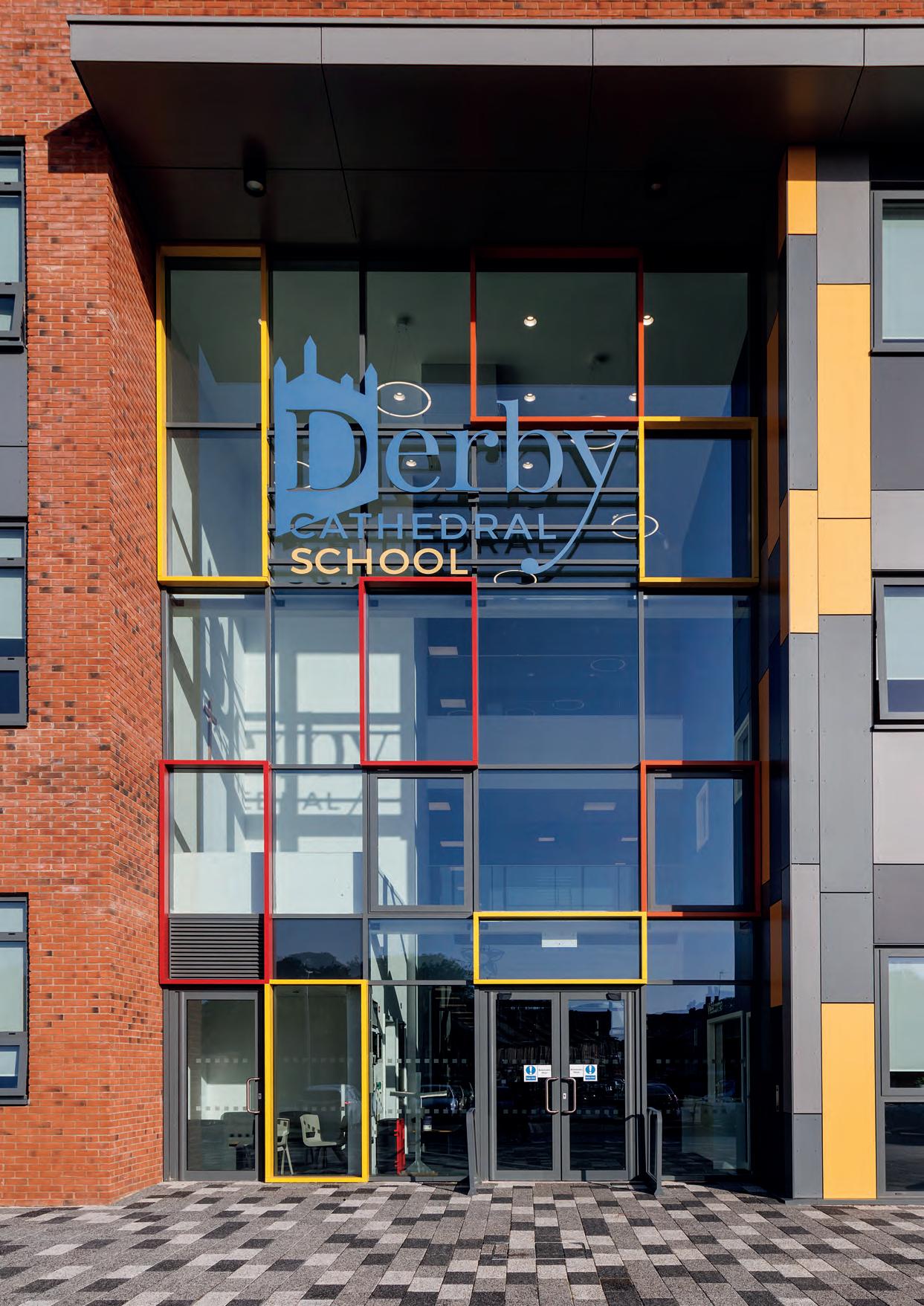
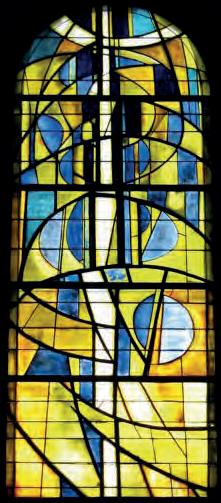
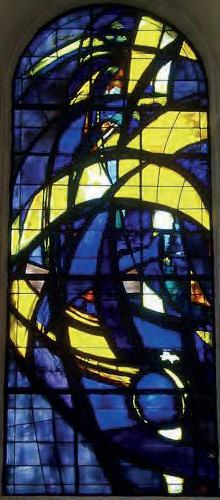




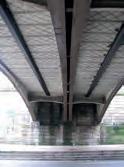
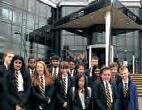
At Derby Cathedral School we take a great deal of pride in our wonderful city and surrounding area and have used this as a connection between the past and future. This history of the school imagery is a strong one, connecting both Derby Cathedral and the site on where the school now stands.
The inspiration for the school colours was taken from the two stunning stained glass windows, The All Saints and The All Souls, which stand either side of the altar in Derby Cathedral. The school was built on the former Friar Gate Goods Yard and the five lines that now make up our branding are taken from the railway lines on the goods yard itself and Friar Gate Bridge. Each line now represents one of our FAITH values (Fellowship, Aspiration, Integrity, Tenacity & Humility).
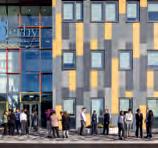
When creating the identity for the Sixth Form, we wished not to be separate from the main school but rather, to be a mature progression while still feeling like an integral part of the wider school community. To do this we decided to use the lighter blue in the iconic stained glass windows , as opposed to the darker blue used more widely in lower school, and have kept the five lines, meaning the Sixth Form will continue to be a recognisable part of Derby Cathedral School as a whole.

The Sixth Form at Derby Cathedral School is committed to ensuring outstanding achievement by all to produce qualified life-long learners. Improving the lives of all young people is at the centre of everything we do. We are an outward facing and inclusive Sixth Form at the heart of its community with a culture of high expectations and holistic education. Sixth-form students are empowered to study a highly developed curriculum in a caring, supportive, and enriching environment, with a clear focus on academic excellence, extensive extra-curricular opportunities and high career aspirations.
We want you as sixth-form students to believe, belong and become so you can forge ‘your career in our community’. As such, we will always place a strong emphasis on curriculum, community, culture and careers.
Believe: As the only Church of England Sixth Form in the County, we welcome students of all faiths and none. We want students to believe in our ethos, and in return, we will offer a transition route and curriculum that cares for the needs of all students which is inclusive, supportive and ensures students study the correct courses and complete their studies successful.
Belong: In our Sixth Form, you will be part of the whole Derby Cathedral School community and its FAITH values. We will ensure you belong to a school that provides a rich learning environment with a culture based on enrichment, challenge, balance, safety, enjoyment, independence and progress. We want you to show commitment, resilience, organisation and a true sense of community.
Become: It is our duty to provide support and create pathways for all our Sixth Form students to progress Post 18 with varied options to support their future careers. This will be built on high aspirations and a commitment to excellent outcomes and destinations regardless of background or personal circumstance. We will ensure you strive to achieve your true potential and leave our Sixth Form qualified and with the skills necessary to become a life-long learner.



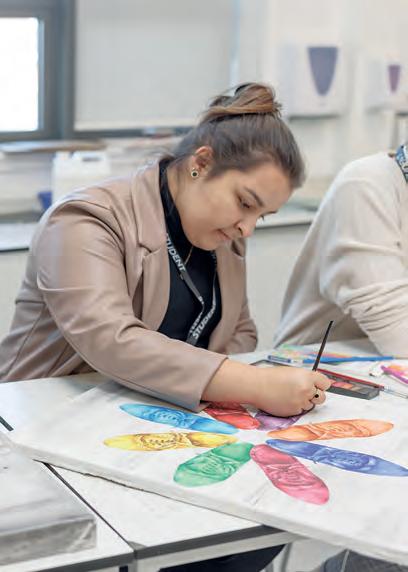
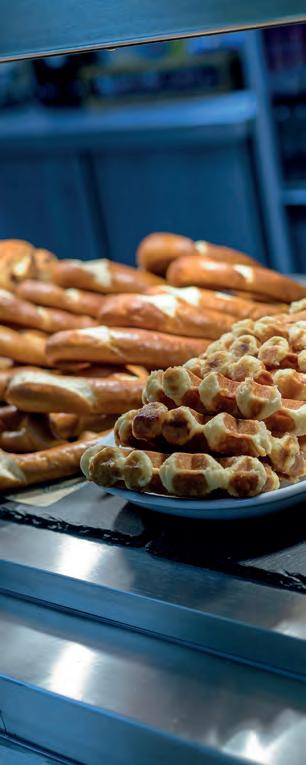
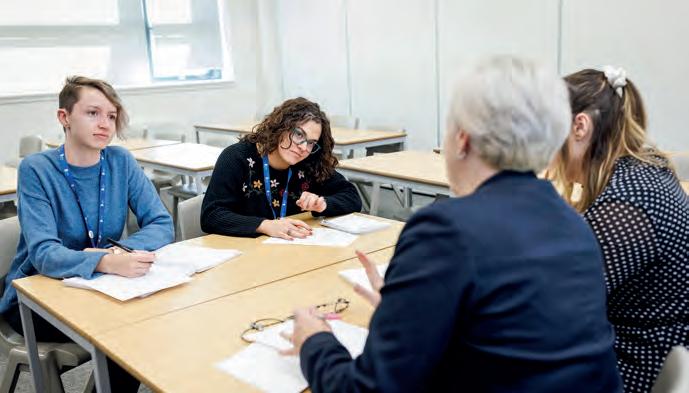
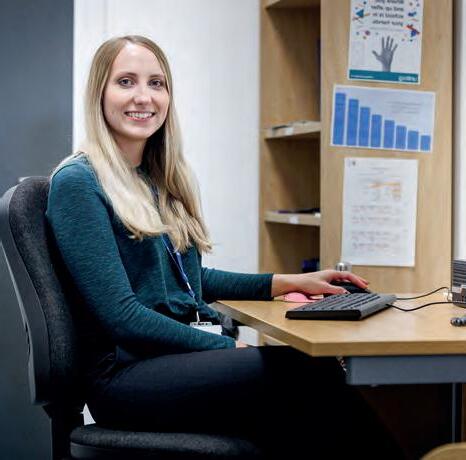
1 A school with a city centre location and established transport links which is open to all students across Derby city
1 Opportunity to study in a brand-new building with state-of-the-art facilities
1 Purpose built spacious classrooms with modern facilities and ICT across our subjects specialisms including specific science laboratories, music rooms, art and technology rooms and a drama studio
1 Dedicated sixth-form-only study spaces open from 8am until 5pm each day including refreshment facilities and a quiet room for individual study. Fridges, hot water, comfy seating, T V, computers, laptops and Wi-Fi are available to provide students with independence and a purposeful working environment
1 Access to brand new sports facilities, including a modern sports hall, football pitches and a fully-equipped fitness suite, with a range of sporting activities and competitive fixtures on offer
1 A staffed learning resource centre, professional assembly hall, specific ICT suites and follow me printing available to Sixth Form students throughout the school
1 A comprehensive induction programme tailored to support your successful transition from GCSE to Sixth Form study including specifc help for those students moving to Derby Cathedral School from another school
1 Relentless pastoral support and personal development, including guidance from a personal Form Tutor, Pastoral Year Lead, Transition Lead, Personal Development Lead and Head of Sixth Form to support your health and wellbeing and encourage you to achieve your full potential
1 Daily Collective Worship Form Time and a weekly timetabled Key Stage 5 PSHE programme of study to promote your study skills, health and wellbeing and support your career aspirations
1 Being part of our house system with a key focus on attendance, rewards and celebrating student achievement
1 Target setting, tracking and monitoring and regular parent and student feedback focussing on progress and areas to improve, including parents evenings, reports and one-to-one guidance to maximise development and chances of success
1 Access to SEND support and the Post-16 Bursary for all eligible students
1 Extensive extra-curricular opportunities beyond the classroom through our Sixth Form specific ‘Endeavour Programme’ to maximise your potential
1 Autonomy to decide on your areas of interest including options in sport, music, drama, culture, charity, voluntary work, teaching, mentoring, Gold Duke of Edinburgh and the opportunity to develop numerous other activities as our Sixth Form continues to grow
1 Calendared work experience in Year 12 as well as a range of subject specific trips and events
1 Leadership opportunities including Prefects, FAITH ambassadors, House Captains, student voice, school event support, School Council and being part of the Sixth Form Student Leadership Team
1 Strong partnerships with our local community and links to careers, universities and businesses with a commitment to meet the Gatsby Benchmarks and develop your employability skills
1 Guided choices and expert advice on Higher Education, Apprenticeships, employment and all other Post 18 progression routes from our in-house Careers Adviser
1 Personalised provision including the use of Unifrog, trips to career events, widening participation, employer talks, mock interviews, CV advice and university, apprenticeship and job application support
1 Super-curricular opportunities to support your Post 18 progression with a focus on degree level literacy, reading lists, masterclasses and Massive Open Online Courses (MOOCs)
1 Specific and tailored individual guidance for those students aiming for highly competitive courses including Medicine, Dentistry, Veterinary Science and Oxbridge
1 Support on A Level Results day to ensure you successfully progress on to your next steps af ter DCS, with the option to become part of our future Sixth Form alumni


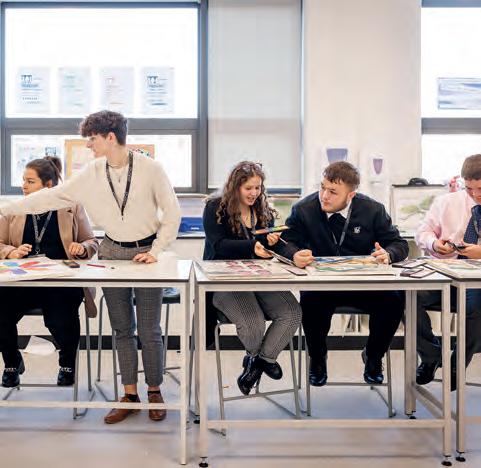



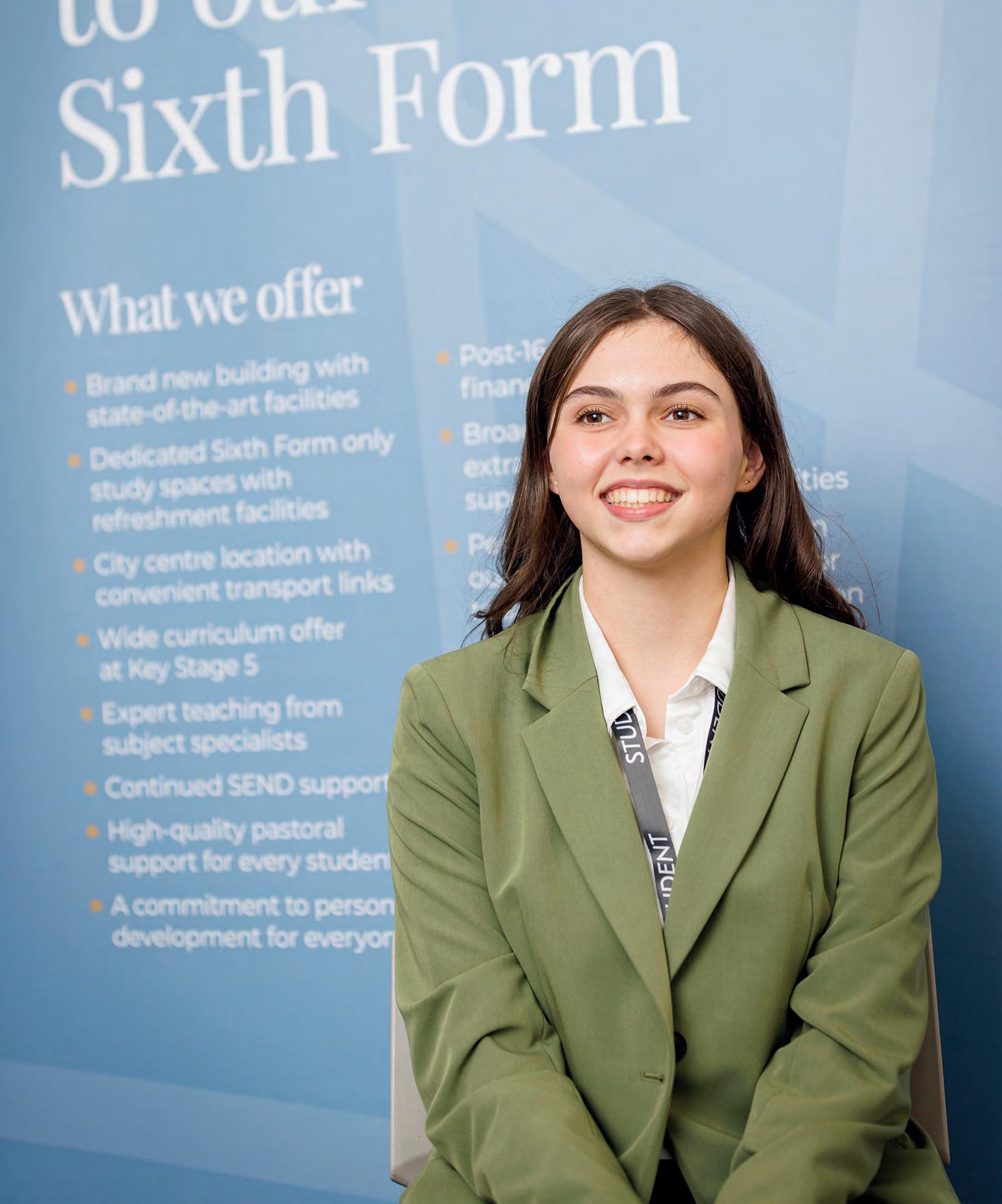
We have high expectations of you, as you should have of us. You will be joining a school community driven to helping you succeed.
By joining our Sixth Form, your commitment is to:
1 Enjoy Sixth Form life here at Derby Cathedral School and experience life in all its fullness (John 10:10).
1 Demonstrate excellent attendance and punctuality throughout your two years of study and follow our dress code.
1 Be committed to your academic and wider curriculum, always meeting deadlines and focusing on personal achievement and attainment.
1 Making use of our study facilities when not timetabled for lessons, working independently and managing your time effectively.
1 Establish effective relationships with all staff and peers to ensure you achieve together and foster a culture of success.
1 Be self-aware and evaluative in order to identify your strengths and areas for improvement.
1 Make a contribution to the whole school and wider community, advocate our FAITH values and be a role model for younger students.
1 Be ambitious and aspirational to achieve your career goals and progress Post 18; a life-long learner.
As an inclusive Sixth Form, we have a broad Level 3 curriculum offer consisting of a mixture of A Level and other vocational courses to ensure students have numerous pathways Post 16.
We have the highest possible standards of teaching and learning and all of our subjects are taught by subject specialists. We focus on the individual and include stretch and challenge, consistent retrieval, revision opportunities and exam smart techniques to maximise student potential.
All students will be expected to choose three subjects which they will study for two years. Students are encouraged to study a broad range of subjects and select courses they enjoy, are successful in and link to their career aspirations.
It is important to note that all of our qualifications are equivalent to one A Level irrespective of name, apart from Core Maths and the Extended Project Qualification (EPQ). These are AS Level equivalents and are only offered as additional areas of study.
This means that students can pick any combination of our subjects, but must pick Core Maths or the EPQ as a fourth subject if they wish to extend their study beyond the typical three subjects. Further Mathematics is also only available as a fourth subject and must be coupled with A Level Mathematics.
All students will be interviewed by a senior member of staff following application and their academic profile should support decisions around the types of qualifications chosen and whether extended study is appropriate. This will enable students to make an informed choice about the best subjects to suit their individual needs and provide an opportunity for guidance around longer term career aspirations.
All students will follow our weekly KS5 PSHE programme and attend Collective Worship and Form Time daily as part of their Sixth Form studies. They will also take part in our Sixth Form specific Endeavour Programme for extra-curricular enrichment.
In Summary, Sixth Form students will usually undertake the following Programme of Study:
Year 12: three or four Level 3 courses + PSHE + Enrichment + EPQ/Core Maths (optional)
Year 13: three or four Level 3 courses + PSHE
KEY:
A Level courses
Vocational courses (A Level Equivalent)
Additional study (worth half an A Level)
Applied Science
Art and Design (Fine Art)
Biology
Business Studies
Chemistry
Computer Science
Criminology
English Language and Literature
English Literature
Food Science and Nutrition
Further Mathematics
Geography
Health and Social Care
History
Mathematics
Music Performance
Performing Arts
Philosophy & Ethics (Religious Studies)
Physical Education (Sport)
Physics
Politics
Psychology
Sociology
Spanish
EPQ
Core Maths
*Note: subjects will run dependent on student numbers
We also offer resit courses in GCSE English Language and GCSE Mathematics. All students who do not achieve at least a Grade 4 in either of these subjects at GCSE will have to retake these in Year 12.
Anyone is welcome to apply to join our Sixth Form provided they meet our entry requirements.
Standard Entry Requirement: Minimum of five GCSE Grades 4 – 9 including English and Mathematics
Students will also need to meet any course specific entry requirements as outlined in the subject curriculum pages that follow.
Examination Board: Pearson BTEC
Qualification Type: Extended Certificate (A Level Equivalent)
Teacher Contact: Miss B Aughton b.aughton@derbycathedralschool.org.uk

For more information go to: https://qualifications.pearson.com/content/dam/pdf/btec-aaqs/ applied-science/2025/specification-and-sample-assessments/btecnational-in-applied-science-specification.pdf
The BTEC National in Applied Science offers a comprehensive curriculum designed to provide students with a solid foundation in scientific principles and practices. The course covers key areas such as biology, chemistry, and physics, emphasizing practical skills alongside theoretical knowledge.
Students engage in various units that explore the application of science in real-world contexts, including laboratory techniques, investigative skills, and the use of scientific equipment. The curriculum is structured to develop critical thinking and problem-solving abilities, with an emphasis on research methods and data analysis. Overall, the BTEC National in Applied Science empowers students with the knowledge and skills needed to succeed in the dynamic scientific landscape.
The course requires you to complete 360 credits over the 2 years of sixth form.
Year 12:
o Principles and applications of biology – 60 credits
o Principles and applications of chemistry – 60 credits
o Principles and applications of physics – 60 credits
Year 13:
o Practical Scientific procedures and techniques – 90 credits
o Science investigations skills – 90 credits
Assessment Method:
Examination Board: AQA
Qualification Type: A Level
Teacher Contact: Mrs A Gibson a.gibson@derbycathedralschool.org.uk
For more information go to: https://www.aqa.org.uk/subjects/art-and-design/ as-and-a-level/art-and-design-7201/specification-at-a-glance

This qualification not only prepares students for higher education in science-related fields but also equips them with skills applicable in various industries, fostering pathways to careers in healthcare, environmental management, and research. The qualification also prepares learners for specialized vocational training and apprenticeships in science-related industries. Additionally, graduates may find entry-level positions in healthcare, laboratory technology, or research roles. The course’s practical focus and emphasis on critical thinking equip students with the skills needed for further study or immediate employment, making it a valuable stepping stone for both academic and career advancement in the scientific field.
Key transferable skills necessary for the BTEC National in Applied Science include critical thinking, data analysis, and effective communication. Students should be adept at problem-solving and decision-making, as these skills are crucial for conducting experiments and interpreting results. Time management and organization are also important for balancing coursework and practical assignments. Additionally, teamwork skills are essential, as many projects require collaboration. Finally, adaptability and attention to detail will help students thrive in diverse scientific environments, ensuring they can apply their knowledge effectively in real-world situations.
Course Overview:
This course is for anyone who loves being creative. You will be introduced to a variety of experiences that explore a range of twodimensional and/or three-dimensional media, processes and techniques. You will be made aware of both traditional and new media. During the course you will explore the use of drawing for different purposes, using a variety of methods and media on a variety of scales. You may use sketchbooks/workbooks/journals to underpin your work where appropriate.
Course Structure:
You will be expected to explore relevant images, artefacts and resources relating to a range of art, craft and design, from the past and from recent times, including European and non-European examples. This will be integral to investigating and making processes. Your responses to these examples must be shown through practical and critical activities that demonstrate your understanding of different styles, genres and traditions. You will be expected to demonstrate skills in the context of your chosen areas of study. You must show work from at least two of the following areas:
Fine art, Graphic communication, Textile design, Three-dimensional design and Photography
Assessment Method:
Progression Opportunities:
Art, craft and design gives you the skills and knowledge to create personal and imaginative work. You can choose to focus on a specialist area of study from a variety of exciting processes and media to suit your individual interests and abilities. This can result in degree opportunities and careers ranging from painting portraits to producing exotic fashion costumes or designing futuristic architecture.
Person Spec. and Transferable Skills:
If you have an adventurous, creative and enquiring mind and are excited by shaping and determining the visual world around us, there is a career opportunity waiting for you.
Entry
Examination Board: AQA
Qualification Type: A Level

Teacher Contact: Mr M Simpson m.simpson@derbycathedralschool.org.uk
For more information go to: https://www.aqa.org.uk/subjects/science/as-and-a-level/ biology-7401-7402

Teacher
Course Overview:
Biology is an ideal choice for students who have an interest in and curiosity about the living world and how organisms work. The course builds upon the concepts and skills that were developed at GCSE. Students will have the opportunity to study many different disciplines in Biology – biochemistry, cellular biology, physiology, ecology, diversity, genetics, variation, evolution and classification. Practical work forms an important part of the course. Students are encouraged to work in a synoptic manner, bringing together differing aspects of Biology to give a holistic answer to problems posed.
Course Structure:
A Level Biology lasts 2 years, with exams at the end of the second year. You will study Topics 1 – 4 in Year 12 and Topics 5 – 8 in Year 13.
Year 1:
1 - Biological molecules
2 - Cells
3 - Organisms exchange substances with their environment
4 - Genetic information, variation and relationships between organisms
Year 2:
5 - Energy transfers in and between organisms
6 - Organisms respond to changes in their internal and external environments
7 - Genetics, populations, evolution and ecosystems
8 - The control of gene expression
Assessment Method:
10% of the overall assessment of A Level Biology will contain mathematical skills equivalent to Level 2 or above.
At least 15% of the overall assessment of A Level Biology will assess knowledge, skills and understanding in relation to practical work.
Due to an ever progressing world Biology remains a desirable A Level for future study. Students use Biology A Level as a route into Medicine, Physiotherapy, Nursing, Veterinary Science, Veterinary Nursing, Optometry, Dentistry, Conservation, Marine Biology, Horticulture, Medicinal Research, Pathology, Forensic Science and many more.
There is the opportunity to participate in a residential fieldtrip in the summer of year 12. This enables the students to complete the practical ecology element of the course and to enhance their learning experience.
Person Spec. and Transferable Skills:
The course content allows students to develop skills in communicating scientific ideas using appropriate language, application of theory, collecting primary scientific data, presenting and processing both primary and secondary data, data analysis and evaluation of experimental technique. There is an emphasis on mathematical skills in biology including statistical analysis of data. Students will also be able to develop their independent research skills.
Course Overview:
This course covers all aspects of business. Would you like to look at a business’s finances and discuss if they are performing well? Not only that would you like to make recommendations to a business based on this? Would you like to know why different businesses operate in the way they do? Would you like to plan, generate and analyse live market research? If you answered yes to any of these then Business Studies would be a perfect fit for you.
Course Structure:
This course is made up of two examined units and three extended projects. The projects give you real life experience of tasks carried out in the business world, including market research and accounting whereas the examined units look into theories surrounding all aspects of the world of business.
Progression Opportunities:
Due to the nature of this course the career pathways are endless. Unit 2 looks at working within a business and so will aid whichever career you choose. Other possible careers are; marketing/ digital marketing, accountancy & finance, human resources, project management, data analysis, purchasing and supply chain management, investment, banking, sales and of course if you were to start your own business you will have all the tools you need to be successful!
Assessment Method:
Units 4, 5 & 11
Coursework
• Teacher marked/assessed and OCR moderated Completed during lessons/ study periods/own time.
Person Spec. and Transferable Skills:
You will need to have a genuine interest in the world of business, good research skills and be able to produce professional reports. Workload and time management skills are essential due to the nature of the course. You will gain hands on experience in carrying out a number of real-life tasks typically completed by business owners and those who work within marketing or finance for larger companies. You will also develop a number of skills needed for further study such as research skills and writing reports to meet deadlines.
Examination Board: AQA
Qualification Type: A Level
Teacher Contact:
Mrs S Wood s.wood@derbycathedralschool.org.uk

For more information go to: https://www.aqa.org.uk/subjects/science/ as-and-a-level/chemistry-7404-7405
A Level Chemistry attempts to answer the big question ‘what is the world made of’ and it’s the search for this answer that makes this subject so fascinating. From investigating how one substance can be changed drastically into another, to researching a new drug to save millions of lives, the opportunities that chemistry provides are endless.
A Level Chemistry lasts two years, with exams at the end of the second year. The list below shows what topics you’ll learn each year in the three branches of Chemistry; physical, inorganic and organic.
Year 1:
Physical chemistry – atomic structure, amount of substance, bonding, energetics, kinetics, chemical equilibria and Le Chatelier’s principle
Inorganic chemistry – periodicity, Group 2 the alkaline earth metals, Group 7(17) the halogens Organic chemistry – introduction to organic chemistry, alkanes, halogenoalkanes, alkenes, alcohols, organic analysis
Year 2:
Physical chemistry – thermodynamics, rate equations, the equilibrium constant Kp, electrode potentials and electrochemical cells
Inorganic chemistry – properties of Period 3 elements and their oxides, transition metals, reactions of ions in aqueous solution
Organic chemistry – optical isomerism, aldehydes and ketones, carboxylic acids and derivatives, aromatic chemistry, amines, polymers, amino acids, proteins and DNA, organic synthesis, NMR spectroscopy, chromatography
Assessment Method:
20% of the overall assessment of A Level Chemistry will contain mathematical skills equivalent to Level 2 or above.
At least 15% of the overall assessment of A Level Chemistry will assess knowledge, skills and understanding in relation to practical work.
There are hundreds of career sectors that look for students with A Level Chemistry, ranging from Agro Chemistry to Textiles. There are many you would not even know existed. Even if you do not choose a career in chemistry, employers know and trust the qualification as a good indicator of intellect and work ethic. An opportunity to enter the Chemistry Olympiad will be available as will a residential course for preparing to apply for Medicine in Year 12.
Person Spec. and Transferable
In addition to chemical knowledge, the course will also develop skills that are valued by universities and employers. These include problem solving, practical skills, working safely, numeracy, literacy, communication, thinking in 3D and teamwork. Pupils will need to have the following skills: An interest in other science subjects and mathematics. Excellent data analysis skills. Ability to use technical language concisely. Drive and enthusiasm for the subject. Ability to carry out practical work carefully. Willingness to carry out further reading around the subject.
Entry Requirements:
Entry Requirement plus;
in GCSE Chemistry and a 5 in one of the other two separate sciences (or 6-6 in Combined Science) and a 5 in GCSE Maths

Course Overview:
Computer Science is a creative subject developing skills such as problem solving and analytical thinking, where students can apply their learning to the real-world combining invention and excitement, to look at the world through a digital prism.
This qualification will enable learners to:
• Apply the fundamentals and concepts of computer science. Analyse problems in computational terms through solving problems and writing programs
2 The specification overview
• Think creatively, innovatively, analytically, logically and critically.
• To see relationships between different aspects.
2a. Overview of A Level in Computer Science (H446)
Course Structure & Assessment Method:
• The characteristics of contemporary processors, input, output and storage devices
• Software and software development
•Exchanging data
•Data types, data structures and algorithms
•Legal, moral, cultural and ethical issues
• Elements of computational thinking
•Problem solving and programming
•Algorithms to solve problems and standard algorithms
The learner will choose a computing problem to work through according to the guidance in the specification.
•Analysis of the problem
• Design of the solution
• Developing the solution
• Evaluation
* Indicates synoptic assessment
Progression Opportunities:
This qualification suits learners intending to pursue any career in which an understanding of technology is required. It is also suitable for any further study as part of a course of general education. It will provide learners with a range of skills, which will facilitate personal growth and foster cross curriculum links in areas such as maths, science and D&T. Job opportunities include Computer Programmer; Hardware Engineer; Software Developer; Systems Manager; Web Developer; Software Engineer; Database Administrator; IT Architect; Computer Games Designer: Systems Analyst; Forensic Analyst; Software development and analytics; Computer Games Tester.
Person Spec. and Transferable Skills:
Students should have a strong interest in Computing; Motivation and resilience for programming and abstract concept development; The capacity for thinking creatively, innovatively, analytically, logically and critically and the maturity and ability to articulate the moral, ethical, legal and cultural implications of a digital society.
Computer Science allows for a huge range of transferable skills from general digital literacy to programming development. Computer Science allows the understanding of digital artefacts which can be applied in a range of creative careers.
Entry Requirements:
Standard Entry Requirement plus; 6 in GCSE Computer Science or equivalent if studied, or a 6 in GCSE Maths
Qualification Type: Applied Diploma (A Level Equivalent)
Teacher Contact:
Mr S Acquah s.acquah@derbycathedralschool.org.uk
For more information go to: https://www.wjec.co.uk/qualifications/ criminology-level-3/#tab_keydocuments
Criminology (from Latin crīmen, “accusation”; and Greek -λογία, -logia) is the scientific study of criminal behaviour, on individual, social and natural levels, and how it can be managed, controlled and prevented.
This course will enable students to use theories of criminality to analyse criminal situations and make recommendations for policy. Students also develop the knowledge and skills to research policy in practice, assess campaigns for changes in awareness and examine information to review verdicts in criminal cases.
The specification:
• attracts UCAS points
• is graded A* - E comprises four units in total, two internally assessed units and two externally assessed units
Course Structure
Year 1
Unit 1 - Changing Awareness of Crime
Follow the content of the specification and complete a controlled assessment that tests your ability to apply knowledge and understanding to a previously unseen crime scenario.
Unit 2 - Criminological Theories
Clear examination and marking structures are provided for this 90 minute examination
Year 2
Unit 3 - Crime Scene to Courtroom
Follow the content of the specification and complete a controlled assessment that tests your ability to apply knowledge and understanding to a crime scenario.
Unit 4 - Crime and Punishment
Clear examination and marking structures are provided for this 90 minute examination.
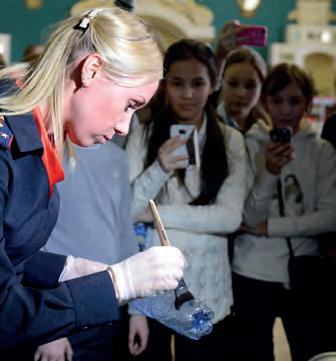
Examination Board: AQA
Qualification Type: A Level
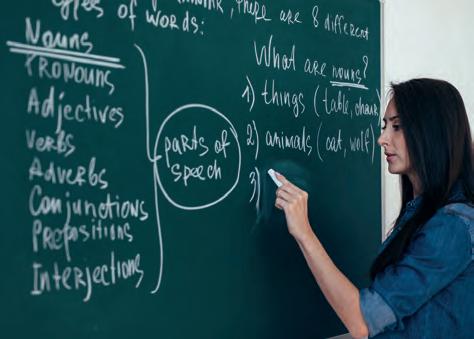
Teacher Contact: Mrs L Pritchard l.pritchard@derbycathedralschool.org.uk
For more information go to: https://www.aqa.org.uk/subjects/english/ as-and-a-level/english-language-and-literature-7707/introduction
Assessment Method:
Candidates are allowed to take their class notes in to internal assessments to support them.
Criminology opens the door to many career paths that require understanding of the justice sector. These include careers in the police force or in police support roles, in forensic psychology, social and probation work or the prison services. Criminology graduates are attractive to employers in areas such as social research and politics.
The course has been designed to provide learners with underpinning knowledge, understanding and skills to progress to further study and training. The study of Criminology will equip you with a wide range of transferable skills; giving you the ability to:
• complete project-based research, and to present it
• collect, analyse and interpret data effectively construct well-informed and reasoned arguments substantiated by relevant evidence
• learn independently and work alongside other peers in a professional environment apply your learning in vocational contexts.
Entry Requirements: Standard Entry Requirement.
Course Overview:
In A Level English Language and Literature, students engage creatively and independently with a variety of spoken, written and multi-modal texts. The course focuses on the integration of language and literature; this specification enables students to see how linguistic and literary methods are related and to explore these links in their work.
Course Structure:
Telling Stories
The aim of this part of the subject content is to allow students to learn about how and why stories of different kinds are told. The term ‘telling’ in the title is deliberately chosen to reflect the twin aspects of how stories are told, and why stories are ‘telling’, or valuable, within societies.
Drawing both on their everyday experiences of storytelling in different modes, and on published texts, students learn how language choices help to shape the representations of different worlds and perspectives.
Exploring Conflict
This part of the subject content focuses on how language choices help to construct ideas of conflict between people, and between people and their societies.
Drawing both on their everyday experiences of interaction in different modes and on published texts, students learn about how the language choices writers make are used to express relationships, drive narrative, and construct views about the nature of different societies.
Making Connections
This part of the subject content focuses on language use in different types of text. It is called ‘Making Connections’ because it requires students to make active connections between a literary
text and some non-literary material. This area of the course provides an individualised experience for students, enabling them to demonstrate their ability to initiate and sustain independent enquiry.
Assessment Method:
Progression Opportunities:
With a qualification in English, you could go into higher education and/or work in the media and communication industry, teaching, administration, publishing or librarianship.
Other common careers with an English degree include, information and research, tourism, events management, social work, youth work, probation work, human resources, retail management and sales.
English Language & Literature students will have developed an impressive array of transferable skills including critical analysis, structuring arguments, selecting evidence, debating interpretations of fictional and non-fiction texts and developing effective creative writing skills.
Entry Requirements:
Standard Entry Requirement plus; 5 in both GCSE English Language and English Literature
Examination Board: AQA
Qualification Type: A Level
Teacher Contact: Mrs L Pritchard l.pritchard@derbycathedralschool.org.uk

For more information go to: https://www.aqa.org.uk/subjects/english/as-and-a-level/ english-literature-a-7711-7712
Examination Board: WJEC
Qualification Type: Applied Diploma (A Level Equivalent)
Teacher Contact: Mrs La Rosa c.larosa@derbycathedralschool.org.uk

For more information go to: https://www.eduqas.co.uk/qualifications/ food-science-and-nutrition-level-3/#tab_keydocuments
Course Structure and Overview:
This A Level consists of three topics:
Love through the ages
The aim of this topic area is to explore aspects of a central literary theme as seen over time, using unseen material and set texts. Students should be prepared for Love through the ages by reading widely in the topic area, reading texts from a range of authors and times.
Students study three texts: one poetry and one prose text, of which one must be written pre-1900, and one Shakespeare play. They will also respond to two unseen poems in the exam.
Texts shared in contexts
The aim of this topic area is to encourage students to explore aspects of literature connected through a period of time.
Students will follow the pathway:
• Option 2A: WW1 and its aftermath
Option A explores literature arising out of WW1, but extends this period to allow reflection on the full impact of the war that reverberates up to the present day.
Independent critical study: Texts across time
In Texts across time, students write a comparative critical study of two texts.
Texts across time provides a challenging and wideranging opportunity for independent study.
Possible themes for the comparison are suggested, but this is not a set list and students are free to develop their own interests from their own wider and independent reading.
Texts chosen for study must maximise opportunities for writing about comparative similarity and difference and must allow access to a range of critical views and interpretations, including over time.
Assessment Method:
It is widely recognised by universities that the skills developed through the study of English Literature are among the most transferable, with English graduates going on to develop the widest range of careers – among the most popular are publishing, broadcasting, marketing and PR, journalism, law, teaching and politics.
Developing your own formal written communication style is a key skill for further studies and in a career: a skill that is highly valued by employers but can be overlooked in the modern world.
Many of the skills developed through studying this subject are related to independent thinking – the ability to analyse sophisticated ideas and the ways in which they are presented, to synthesise large and complex text, and to know how to build a convincing argument are just a few.
Entry Requirements:
Course Overview:
This course is an exciting opportunity to learn about Food Science and Nutrition through hands on practical experiences. Many employment opportunities within the field of food science and nutrition are available to learners who have studied Food Science and Nutrition. Over 20% of the top 100 British companies are in food manufacturing. The UK produces approximately 1000 ‘food’ graduates per year, it has been forecast that the industry will have 2000 graduate vacancies.
Course Structure:
You will complete three units: two mandatory and one optional.
The first mandatory unit: Unit 1 Meeting nutritional needs of specific groups will enable you to demonstrate an understanding of the science of food safety, nutrition and nutritional needs in a wide range of contexts.
The second mandatory unit: Unit 2 Ensuring Food is Safe to Eat will allow you to develop your understanding of the science of food safety and hygiene; essential knowledge for anyone involved in food production in the home or wishing to work in the food industry.
Studying one of the two optional units Unit 3 Experimenting to Solve Food Production Problems or Unit 4 Current Issues in Food Science and Nutrition will allow you the opportunity to study subjects of particular interest or relevance to you, building on previous learning and experiences.
Assessment Method:
Unit 1 Mandatory 90 minute exam and one internal assessment
Unit 2 Mandatory 8 hour supervised external assessment Unit 3 or 4 Optional Choice Internal assessment
Progression Opportunities:
Together with other relevant qualifications at Level 3, such as A Level Biology, Chemistry, Physical Education and Maths, learners will gain the required knowledge to use the qualification to support entry to higher education courses such as:
BSc Food and Nutrition
BSc Public Health Nutrition
BSc Food Science and Technology
Person Spec. and Transferable Skills:
This course is suitable for learners who enjoy practical experiences and can cope well with the pressures of a busy kitchen environment. Learners will want to investigate how ingredients work by carrying out food investigations and produce dishes that are suitable for different needs. Many transferrable skills will be developed including the skills of project-based research, development and presentations and the fundamental ability to work alongside other professionals, to name just a few!
Examination Board: Pearson
Qualification Type: A Level
Teacher Contact:
Mr S Sakaria s.sakaria@derbycathedralschool.org.uk

For more information go to: https://qualifications.pearson.com/en/qualifications/edexcel-alevels/mathematics-2017.html#%2Ftab-AlevelFurtherMathematics
Examination Board: AQA
Qualification Type: A Level
Teacher Contact: Ms B Woodward b.woodward@derbycathedralschool.org.uk

For more information go to: https://www.aqa.org.uk/subjects/geography/ as-and-a-level/geography-7037
Course Overview:
This course is available to students with exceptional mathematical ability who are considering taking Mathematics beyond A Level. Anyone willing to study Further Mathematics must also be studying A Level Mathematics. The Pure element will be taken further and you will delve deeper into the applied aspect of the subject. Students taking Chemistry, Biology or Psychology may have a greater desire to study Statistics further, whereas Physics students may prefer to take mechanics a step further as part of the optional modules.
Course Structure:
The Further Maths course is made up of two pure and then two optional modules that take statistics and/or mechanics further. Within the pure element of the course, students will study proof, complex numbers, matrices, further algebra and functions, further calculus, polar coordinates, hyperbolic functions & differential equations. Each module is of equal weighting and counts for 25% of the overall A Level. The Further Mathematics options will be considered and tailored where possible to suit the cohort each year.
Assessment Method:
Progression Opportunities:
Higher education courses or careers that either require A Level Mathematics or are strongly related include: Economics, Medicine, Architecture, Engineering, Environmental Studies, Information Science, Surveying, Teaching, Mathematics, Accountancy, Financial Services, Psychology, Computing, Information Communications Technology, Statistics, Systems Analysis, Systems Modelling
Person Spec. and Transferable Skills:
Higher education institutions and employers have flagged the need for students to develop a range of transferable skills to respond with confidence to the demands of undergraduate study and the world of work. Further Mathematics involves building cognitive skills such as non-routine problem solving, systems and critical thinking as well as inter and intrapersonal skills such as communication, collaborative problem solving, adaptability, self management and self development.
Entry Requirements: Standard Entry Requirement plus; 7 in GCSE Maths and must be taken in addition to A Level Maths
Course Overview:
How does space influence the people living there, and how do people shape the landscapes around them? As populations and economies continue to grow, how can we ensure we remain sustainable and don’t run out of vital resources? These are some of the big questions underpinning A Level Geography in a globalising world, where the skills of geographers are more important than ever.
Course Structure:
The A Level Geography course includes a balanced study of physical and human geography with students studying the following topics: Water and Carbon Cycles, Coastal Systems and Landscapes, Hazards, Global Systems and Global Governance, Changing Population and the Environment In addition to this, throughout the course students will engage with qualitative and quantitative data, including observations, geospatial mapping, statistical skills and data manipulation. These will be of importance when students undertake 4 days of fieldwork prior to carrying out their own independent fieldwork investigation.
Assessment Method:
examined
,000 – 20% (Independent Fieldwork 4,000 Investigation) words
Although more than 80% of A Level Geographers go on to university, less than 20% study Geography. This means Geography is seen as a gateway subject, with significant percentages going on to study biological sciences, social sciences, business and law. Of those going to university, Geography students rank amongst the highest in university student satisfaction surveys, have some of the lowest graduate drop-out rates, and have higher than average graduate employment rates and earnings. For those not following a higher education pathway, the expert skills that they learn during their A Level studies will support them in their chosen career.
The core skills in A Level Geography are highly desirable and transferable. Students are able to have an understanding of the natural and human world and the interactions between them, considering the impacts of systems and processes at a range of scales, as well as contemporary and cultural issues. Critical analysis underpins Geography, and collecting, understanding and interpreting large, complex data, as well as researching information and communicating findings effectively, make geographers highly desirable employees. A Level Geography also teaches students how to use geospatial technology – a newly emerging and fast growing sector.
Standard Entry Requirement plus; 5 in GCSE Geography if studied, or a 5 in GCSE English and Maths
Examination Board: OCR
Qualification Type: Extended Certificate (A Level Equivalent)
Teacher Contact: Miss J Sowter j.sowter@derbycathedralschool.org.uk

For more information go to: https://www.ocr.org.uk/qualifications/cambridge-technicals/ health-and-social-care/#level-3
Examination Board: OCR
Qualification Type: A Level
Teacher Contact: Mr M Adler m.adler@derbycathedralschool.org.uk

For more information go to: https://www.ocr.org.uk/qualifications/as-and-a-level/ history-a-h105-h505-from-2015/
Course Overview:
The health and social care sector plays a vital role in our community and is constantly evolving and developing for individuals who may need to use its services. As demand continues to rise for health and social care provision, job roles in the sector will continue to be popular and grow. This qualification gives learners a combination of technical and academic skills that can be applied to a range of careers.
Course Structure:
Learners taking this qualification will complete six units: four mandatory and two optional.
Year 12: Unit 1 – Building Positive Relationships in Health and Social Care. This unit aims to introduce you to many different relationships that you will encounter within the health and social care sector. You will apply communication and relationship building skills and develop an understanding of the concept personcentred approach.
Unit 2 – Equality, Diversity and Rights in Health and Social Care. This unit will help you to understand the implications of diversity on practice and effects of discrimination on individuals who require care or support. You will explore strategies used to promote equality, diversity and support individual rights.
Unit 3 – Health, Safety and Security in Health and Social Care. This unit introduces you to the necessary knowledge and skills to maintain a safe working environment for service users and service providers. You will consider different types of hazards and how to respond to different incidents and emergencies.
Unit 13 – Sexual Health, Reproduction and Early Development Stages. This unit will look at the development from conception to a one year old. You will also consider the importance of sexual health and contraception. Following this, you will explore pre-natal health and the various stages of pregnancy.
Year 13: Unit 4 - Anatomy and Physiology for Health and Social Care. This unit introduces you to the basic
structure and functions of the body systems including the cardiovascular, respiratory and digestive systems. You will also understand the part played by organs such as the pancreas, liver and kidney. You will also explore well-known diseases, disorders and malfunctions.
Unit 10 - Nutrition for Health. This unit introduces nutritional health and the components of good nutrition. You will have the opportunity to scrutinise different foods, consider their health benefits and investigate how to support people to impact their health and well-being.
Assessment Method:
1 and 13 Coursework in Year 12
2 and 3 Exams in Year 12
4 Exam in Year 13
10 Coursework in Year
On completion of this qualification, you could progress into health and social care apprenticeships, employment or complete a degree at university. Students often progress onto studying the following courses or carry out careers in the following:
• Nursing
• Social Work
• Dietician
• Health Visitor • Midwife • Food Scientist
Person Spec. and Transferable Skills:
This course is suitable for learners who have an interest in working with or caring for other people. If you are somebody who thrives in a vocational context, this Cambridge Technical course will provide an opportunity to develop the knowledge and skills required for future employment within the health and social care sector. This qualification will give you the chance to develop communication, organisation, time management, research, analytical and evaluative skills.
Entry Requirements: Standard Entry Requirement.
Course Overview:
We are excited to bring this course to you as it will allow you to develop your passion for history. You will get closer to understanding the world we live in and develop a deeper knowledge of the politics and society of Britain, Europe and the wider world. You will develop an unparalleled insight into patterns of politics, diplomacy, economics and human behaviour. It will enable you to understand and comment on the world in which you are now part of.
Course Structure:
Year 12
• Unit 1: Britain 1930-1997. The significance of Churchill and how the key events of the 20th Century moulded modern Britain.
• Unit 2: The French Revolution and Napoleon 1774-1815. The causes and consequences of the first modern revolution.
Year 13
• Unit 3 Civil Rights in the USA 1865-1992. This unit will unpick the struggle of citizens in the USA to gain equality before the law.
• Unit 4 Historical enquiry, personal study on the Holocaust. Students will be given the opportunity to create and challenge their own hypotheses and complete an extended piece of coursework.
Assessment Method:
Progression Opportunities:
You will develop essential skills which are vital for careers in the law, academia, the heritage sector, politics, public affairs, business, teaching, diplomacy and the British Government and Civil Service. History is widely accepted as one of the most traditional and rigorous academic subjects and is highly valued by the top universities in the world.
“History is to the nation as memory is to the individual.” – Arthur Schlesinger
Person Spec. and Transferable Skills:
• A passion and enthusiasm for History
• The desire to find out about the past and how it has shaped the future
• The ability to analyse and challenge ideas and interpretations about the past.
• The ability to express your ideas in writing
Entry Requirements:
Standard Entry Requirement plus; 5 in GCSE History if studied, or a 5 in GCSE English and Maths
Examination Board: Pearson
Qualification Type: A Level
Teacher Contact:
Mrs S Sakaria
s.sakaria@derbycathedralschool.org.uk

For more information go to: https://qualifications.pearson.com/en/qualifications/edexcel-alevels/mathematics-2017.html#%2Ftab-AlevelMathematics
Examination Board: Pearson BTEC
Qualification Type: Extended Certificate (A Level Equivalent)
Teacher Contact: Mrs J Eaton j.eaton@derbycathedralschool.org.uk

For more information go to: https://qualifications.pearson.com/ content/dam/pdf/BTEC-Nationals/Music/2017/Specification/ 9781446928110_BTEC_Nat_ExtCert_Music_Spec_prepubfinal.pdf
Course Overview:
Studying Mathematics at A Level will enable candidates to further develop their understanding of mathematical processes. Students will extend their range of skills and techniques and use them in more difficult, unstructured problems. An understanding of coherence and progression in mathematics will be developed and how different areas of mathematics can be connected and modelled. The connections between ‘realworld’ problems and other mathematical models will be explored and how these can be used as an effective means of communication.
Course Structure:
Pure Mathematics: extends knowledge of GCSE topics such as algebra, geometry and trigonometry as well as studying brand new concepts such as calculus.
Mechanics: learn how to model physics situations into simple maths problems to be analysed and solved; from cars in the street, to satellites revolving around a planet.
Statistics: learn how to analyse and summarise numerical data in order to arrive at conclusions to help predict the future.
Assessment Method:
A Level Mathematics is a much sought after qualification for entry to a wide variety of full time courses in higher education. There are many areas of employment that see a Mathematics A Level as an important qualification and it is often a requirement for the vocational qualifications related to these areas. Many of the ideas met in the mechanics course form an almost essential introduction to fields of study such as cybernetics, robotics, biomechanics and sports science. The statistical processes met in the course are widely used throughout the world, in psychological surveys, biomedical research and global warming to name a few. An A Level in Maths is truly a master key of a qualification.
If you enjoyed the challenge of problem solving at GCSE then the prospect of further study should be very appealing. Pure Mathematics can be extremely rewarding in its own right, but applying these skills to statistical and mechanical situations can really show the relevance of Mathematics in the world around us.
Entry Requirements:
Standard Entry Requirement plus; 7 in GCSE Maths.
Course Overview:
Where words fail, music speaks. The BTEC Level 3 Music course at DCS is a largely practical course, centring on performing, producing and creating music. We understand that the reason many students opt for a music course is because they want to practically explore this art form and industry. Therefore, that is what we have planned - putting you, the student, at the very heart of this. We have incorporated links to the music industry through our collaboration with Dubrek Studios in Derby giving students the opportunity to learn about the music industry and recording studios, where they can perform and produce their own music.
Course Structure:
Learners taking this qualification will study three mandatory units:
Unit 1: Practical Music Theory and Harmony
Unit 2: Professional Practice in the Music Industry
Unit 3: Ensemble Music Performance.
Learners choose one optional unit. These have been designed to support progression to more specialist music courses in higher education and to link with relevant occupational areas:
Unit 4: Composing Music
Unit 5: Music Performance Session Styles
Unit 6: Solo Performance
Unit 7: Improvising Music
Assessment Method:
Progression Opportunities:
The qualification carries UCAS points and is recognised by higher education providers as contributing to meeting admission requirements for many courses. As a vocational course, it will provide you with great experience, meaning you can progress on to university, the music sector or head straight into industry.
This course is suitable for students with a passion and commitment to music. There will be numerous opportunities for extra-curricular studies and an expectation to get involved in performances to showcase and practise your skills. This qualification gives learners many transferable and higherorder skills that are valued by higher education providers and employers, for example performance techniques, communication skills and team working. It also gives learners an opportunity to focus on their personal vocal/instrumental technique whilst developing effective writing techniques, analytical skills and creative development.
Entry Requirements: Standard Entry Requirement plus;
Students who have not completed a GCSE/BTEC in Music may be asked to attend a short audition for consideration.
Examination Board: Pearson BTEC
Qualification Type: Extended Certificate (A Level Equivalent)
Teacher Contact: Miss A Wrampling a.wrampling@derbycathedralschool.org.uk
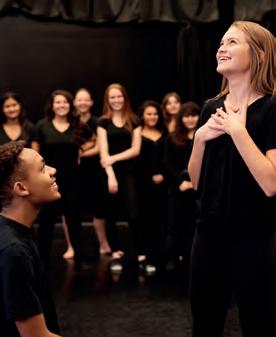
For more information go to: https://qualifications.pearson.com/content/ dam/pdf/BTEC-Nationals/Performing-Arts/2016/specification-and-sampleassessments/9781446938362_BTEC_Nat_ExtCert_PA_Spec_Iss2C.pdf
Performing Arts aims to develop creative, confident and well-nurtured actors and performers. This BTEC Level 3 qualification gives students many performance opportunities, whilst developing their devising and understanding of key practitioners. A large factor in this course is working in a group, where students will take different roles working towards an ensemble performance.
The three mandatory units focus on:
Unit 1: Investigating Practitioners’ work: research, critical analysis and extended writing skills that aim to support learners’ progression to higher education. Learners will gain a good understanding of the work of influential practitioners to inform their own work and practice
Unit 2: Developing Skills and Techniques for Live Performance: an introduction to the performing arts where learners will develop the appropriate skills and techniques in various performance disciplines such as acting, dance, musical theatre and physical theatre
Unit 3: Group Performance Workshop: group performance, where learners will develop the essential psychomotor and affective skills essential for the performing arts. They will develop physical techniques as well as wider transferable skills, such as being able to work collaboratively, personal management and organisation (rehearsals, time-management), being able to give and take direction, confidence in front of an audience, problem solving (refining the process) and teamwork. Learners will understand different audiences in different environments and will learn to adapt a performance to engage the target audience.
Learners select one optional unit to support their choices from:
Unit 19: Acting Styles
Unit 20: Developing the Voice for Performance Unit 28: Variety Performance.
Assessment Method:
(Religious Studies)
Examination Board: OCR
Qualification Type: A Level
Teacher Contact: Mr. S Richardson: s.richardson@derbycathedralschool.org.uk

For more information go to: https://www.ocr.org.uk/Images/242913-specification-accredited-alevel-gce-religious-studies-h573.pdf
Course Overview:
The qualification carries UCAS points and is recognised by higher education providers as contributing to meeting admission requirements for many courses. Students often progress on to studying Theatre Studies and Drama courses at university or Drama schools, though this course also opens the door to numerous other progression opportunities, allowing you to stand out from the crowd. The career possibilities are endless and students often couple their performance skills with other areas of study.
This course is suitable for students who enjoy drama and enjoy being creative and collaborative. This qualification provides learners with the opportunity to develop all-round performance skills and transferable skills such as self-confidence, self-presentation, personal discipline, time management and organisation. You will also develop the ability to learn independently, research actively and methodically, give presentations and be an active group member.
Students study philosophical language and thought, and issues and questions raised by belief. This includes arguments for the existence of God in Year 12 and ideas about the nature of God in Year 13. There is also an exploration of ethical theories and their application which incorporates ideas relating to the rights and wrongs of euthanasia in Year 12 and sexual ethics in Year 13. The third strand involves a systematic study of the Christian faith ranging from the person of Jesus and moral principles in Year 12 to issues relating to Christianity and gender, society, pluralism and secularism in Year 13.
Course Structure:
Three separate components are taught across two years with three final exam papers. Each module is broken down into AS units taught in Y12 and A2 units taught in Y13. The component titles are:
Component 1: Philosophy of religion.
Component 2: Religion and ethics.
Component 3: Developments in Christian thought.
Assessment Method:
Progression Opportunities:
This A Level is extremely desirable for any future career that deals with people e.g. teaching, the legal profession or any of the caring professions. Jobs such as nursing, social work, the police or nursery care require the essential skills of empathy, respect and acceptance that Religious Studies celebrates and teaches. Areas of work such as journalism and law that expect thoughtful, reflective thinkers who can skilfully communicate ideas would also benefit. It is also a well-respected subject in its own right and suitable for entry into a wide range of other professions.
Person Spec. and Transferable Skills:
This course is suitable for students who enjoy having the opportunity to express their ideas and opinions both verbally and in written essays. This A level helps students to develop their higher order thinking skills, for example: enquiry, critical thinking and evaluation. These are skills which both employers and Universities highly value. The subject is classified as important for students entering English, History, History of Art, Philosophy, Politics, Religious Studies and Theology degrees.
Entry Requirements:
Standard Entry Requirement plus; 5 in GCSE Religious Studies if studied, or a 5 in GCSE English
Examination Board: Pearson BTEC
Qualification Type: Extended Certificate (A Level Equivalent)
Teacher Contact:
Mr M Rawson M.Rawson@derbycathedralschool.org.uk
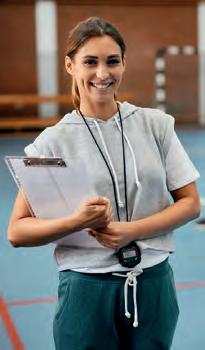
For more information go to: https://qualifications.pearson.com/ content/dam/pdf/BTEC-Nationals/Sport/20161/specification-andsample-assessments/btec-l3-national-ext-cert-in-sport-spec.pdf
Examination Board: AQA
Qualification Type: A Level
Teacher Contact: Mr M Shooter m.shooter@derbycathedralschool.org.uk
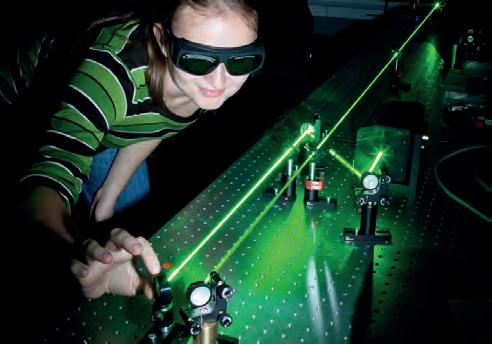
For more information go to: https://www.aqa.org.uk/subjects/science/as-and-a-level/ physics-7407-7408
Course Overview:
If you are passionate about sport and have outstanding physical ability in at least one sport, then BTEC Level 3 National Extended Certificate in Sport could be the course for you. The course will enable you to develop theoretical knowledge and understanding of the factors that underpin physical activity and sport and enable you to use this knowledge to improve your practical performance. You will study units of physiology and psychology and understand how these also affect performance. You will refine your ability to perform effectively by developing skills and techniques as well as selecting and using strategies and tactics.
Course Structure:
The course will build on your knowledge from GCSE/ BTEC/ CNAT level 2 and add exciting new topics.
• Anatomy and Physiology
• Fitness Training and Programming for Health, Sport and Well-being
• Professional Development in the Sports Industry
• Practical sports performance
• Leadership in sport
Extra-curricular activities
Various sports clubs, sixth form football, opportunities to coach sessions within the PE department, links to clubs, curriculum support in key stage 3 PE lessons, extra-curricular delivery and support.
Assessment Method:
Progression Opportunities:
After completing the course, Level 3 graduates go on to study a variety of university courses within the sports sector. These degrees range from physiotherapy, sports coaching, occupational therapy, sports rehabilitation, sports journalism, or to train as a PE teacher. Some of our students may also take the apprenticeship route which can lead to employment.
Physical Education (Sport) is for students who have a good background in sport and a real interest in the theoretical aspects. The course is ideal preparation if you intend to study Physical Education, Sports Science or Sports Coaching at degree level. This course brings together knowledge and understanding with practical and technical skills. You will develop transferable skills such as communication, teamwork, research and analysis, which are valued in both higher education and the workplace.
Course Overview:
The A Level Physics course enables students to build on their GCSE concepts and develop knowledge of the laws of Physics. Students will also develop their investigating skills through practical activities and will also need to utilise mathematical skills. The subject is a gateway into a variety of careers and university courses.
Course Structure:
The course is split into 8 core units, and Astrophysics as our chosen option:
1. Measurements and their errors
2. Particles and radiation
3. Waves
4. Mechanics and materials
5. Electricity
6. Further mechanics and thermal physics
7. Fields and their consequences
8. Nuclear Physics
9. Astrophysics
Assessment Method:
Progression Opportunities:
Physics is the fundamental science. It is central to our understanding of the nature of matter and the universe around us and the basis of all developments in high technology and engineering. There is no industry, commercial activity, medical treatment, communications system, or form of entertainment that does not depend on the application of Physics principles. More than 50% of all qualified physicists work in Research and Development, Engineering, and Information Technology.
Person Spec. and Transferable Skills:
Pupils are encouraged to look at Physics in the context of the wider world and to use the skills and knowledge they acquire to solve problems. They also work on challenges arising in the application of physical ideas to industrial problems. You will develop numerical, analytical and practical skills that are highly sought after by employers.
40% of the overall assessment of A Level Physics will contain mathematical skills equivalent to Level 2 or above.
At least 15% of the overall assessment of A Level Physics will assess knowledge, skills and understanding in relation to practical work.
Standard Entry Requirement
Examination Board: AQA
Qualification Type: A Level
Teacher Contact:
Mr M Adler m.adler@derbycathedralschool.org.uk

For more information go to: https://www.aqa.org.uk/subjects/politics/a-level/politics-7152
Examination Board: AQA
Qualification Type: A Level
Teacher Contact: Miss J Sowter j.sowter@derbycathedralschool.org.uk

For more information go to: https://www.aqa.org.uk/subjects/psychology/as-and-a-level/ psychology-7181-7182/specification-at-a-glance
Course Overview:
This course aims to provide students with an in depth understanding of political theory and how it’s applied in British and American Politics. It is an engaging, relevant and controversial subject that will cover news and current affairs whilst developing research, communication and debating skills. Students will study political theory, including Liberalism, Conservatism, and Socialism. We will then build on this understanding to examine how Politics works in practice, with firstly the Government and Politics of the UK, then the Government and Politics of the USA.
Course Structure:
Over the 2 years, students will cover the following topics:
• Political Ideologies
• Constitution and judiciary
• The legislature
• Multi-level governance
• Political parties
• Electoral process and direct democracy
• Participation Assessment Method:
Progression Opportunities:
Students use A Level Politics as a platform for careers in Law, Media, Journalism, the Civil Service, the Police, Local/National Government and Teaching. It is seen as a traditional academic subject and is extremely well respected by universities and employers alike. The ability to read and understand complex texts, analyse and evaluate the information and then construct a coherent essay based on those texts is an invaluable skill that is applicable and relevant to all disciplines.
Person Spec. and Transferable Skills:
An interest in current affairs and politics (essential)
• The ability to express your ideas in writing and verbally
• The desire to understand and challenge the views of others and the confidence to get involved in discussions and debates
• The ability to analyse, apply theories, write in depth and evaluate
The most important requirement is an interest in how the country and the world are run and a willingness to contribute ideas to discussions on political topics.
Course Overview:
The Psychology A Level course enables students to understand the complexities of human behaviour by taking a scientific approach to studying and understanding people. We explore one of the most intricate machines on our planet, the brain, and use psychological research to investigate behaviours and provide practical solutions. If you are interested in human behaviour and why we are all different, but also share similarities, then A Level Psychology is for you.
Course Structure:
Year 12:
Approaches – including the key theories in psychology and its supporting research. You will explore Behaviourism, Social Learning Theory, Cognitive, Psychodynamic, Biological and Humanism.
Memory – including the different models of memory, explanations for forgetting and eyewitness testimony.
Social influence – including why some people conform and obey others.
Attachment – including how we attach to our caregivers and what happens if no attachment is formed.
Research Methods –including looking at the ways psychologists investigate behaviour.
Psychopathology – including definitions of abnormality and mental disorders and why the theories say they develop along with possible treatments.
Biopsychology – including how the biological systems of the body and the brain function and the impact on human behaviour.
Year 13:
Gender – including how and why the genders behave in different ways.
Schizophrenia – including the causes of schizophrenia and the potential treatment methods for the disorder.
Forensics – including offender profiling, theories of offending and ways of dealing with offender behaviour.
Issues and debates – including nature versus nurture, free will versus determinism, ethical implications in research, as well as gender and culture in psychological research.
Assessment Method:
Progression Opportunities:
Studying Psychology at university can lead on to a variety of different careers. Here are a selection: • Psychology • Clinical Psychologist • Educational Psychologist • Forensic Psychologist • Teaching • Policing • Business • Nursing • Art and Drama
Person Spec. and Transferable Skills:
This A Level course would suit a student who enjoys questioning theory and research. You will also need to enjoy extended writing, as the assessment is 100% written exam at the end of the 2 years. A willingness to discuss ideas and apply them to real life cases is a major requirement of this course.
The skills you will learn will serve you well in any future career. These include critical thinking, data analysis skills, extended writing and research planning skills.
Entry Requirements:
Standard entry
Examination Board: AQA
Qualification Type: A Level
Teacher Contact: Miss J Sowter j.sowter@derbycathedralschool.org.uk

For more information go to: https://www.aqa.org.uk/subjects/sociology/as-and-a-level/ sociology-7191-7192
Course Overview:
Ever wondered how we developed into the society we are today? How the way you see yourself determines the way people identify you? Whether men or women are more likely to commit a crime?
A Level Sociology will help you to make sense of the society we live in and understand the cultural issues which affect us all. You will learn a number of skills including the use of evidence to support your arguments, how to investigate facts, and critical thinking. It is relevant to the society you live in so you are bound to enjoy learning about topics that are relevant to everyday life; plus it opens the door to a fantastic range of interesting careers.
Course Structure:
Year 12:
Education – including which social groups do best in education and why, changing education policy and the role of education in society.
Methods – including methods used by sociologists to support theories and investigate society. Methods in Context – including application of a range of sociology research methods to the study of education. Families and Households – including trends in marriage and divorce, changing notions of childhood and the purpose of living in family units.
Year 13:
Beliefs in Society – including the social role of religion, how religion influences social change and the difference between religion and science.
Assessment Method:
Crime and Deviance – including why people commit crime, which groups are most likely to commit crime and how we might reduce crime in society.
Theory and Methods – including the key sociological theories such as Functionalism, Marxism, Feminism, Interactionism and Postmodernism, as well as core debates.
Progression Opportunities:
Studying Sociology at university can lead on to a variety of careers. Here are a selection:
• Social work
• Human resources
• Policing
• Marketing
• Journalism • Law
• Teaching
• Civil servant
Person Spec. and Transferable Skills:
A Level Sociology will help you develop a range of skills that will benefit you, whether you decide to go on to further study or the working world, including:
• the use of evidence to support your arguments
• how to investigate facts and use deduction
• critical thinking
• making reasoned arguments
• developing opinions and new ideas on societal issues
• the ability to analyse and better understand societal issues.
Entry Requirements: Standard Entry Requirement.
Examination Board: AQA
Qualification Type: A Level
Teacher Contact:

Mrs K McLennan K.mclennan@derbycathedralschool.org.uk
For more information go to: https://www.aqa.org.uk/subjects/languages/as-and-a-level/ spanish-7692
Course Overview:
This course is designed to enable students to develop their linguistic skills alongside their understanding of the culture and society of the countries where Spanish is spoken. Moving on from GCSE, students attain a greater level of fluency in the language, improving their interpersonal and communication skills, striving to become successful global citizens. They will use language spontaneously, also be able to read and respond to a variety of texts and media, also applying analytical skills in written and spoken work.
Course Structure:
Students will study:
Aspects of Hispanic society, multi-culturalism in Hispanic society Artistic culture in the Hispanic world
Aspects of political life in the Hispanic world.
Grammar
Literary texts and films – Students will study one Spanish language film and one Spanish language text. They will then respond to, and analyse these works in the form of written essays.
Individual research project – Students must identify a subject or a key question which is of interest to them and which relates to one or more Spanish speaking countries, then select relevant information in Spanish from a range of sources and present and discuss their findings in the speaking assessment.
Assessment Method:
Progression Opportunities:
More than 6,000 students per year, who study languages at A Level, go on to study them at University. However, even if you don’t want to go to University, having a second language is an incredibly transferrable life skill. The ability to speak more than one language and knowledge of different cultures, can be useful in a wide variety of different sectors of employment. These include, but are not limited to: The civil service, education, hospitality, tourism, IT and telecommunications, law, marketing, publishing, media and journalism, recruitment, HR, retail, sales, customer service, transport and logistics.
Person Spec. and Transferable Skills:
The Spanish A Level course is suitable for individuals who have a passion for the language and are prepared to learn and practise independently. This course will appeal to those who wish to develop their cultural capital, analytical and communication skills. Being a linguist makes you more articulate and keeps your brain active; it also helps you to develop a more compassionate and empathetic approach to other cultures, leading to a higher level of mutual respect.
Entry Requirements:
Examination Board: AQA
Qualification Type: Level 3 Certificate (AS Level Equivalent)
Teacher Contact: Mr A McIntyre a.mcintyre@derbycathedralschool.org.uk

For more information go to: https://www.aqa.org.uk/subjects/ projects/project-qualifications/EPQ-7993/specification-at-a-glance
Course Overview:
The EPQ is a qualification designed to develop and extend your abilities beyond the core Level 3 curriculum and prepare you for university or a future career. It allows students to produce a piece of work that is individual to them, which could be a written research report or creative artefact. It is essentially an independent research project that is devised and managed by the student and supported in school through teaching, supervision and assessment. The qualification is well respected by universities and is equivalent to an AS Level worth 28 UCAS points.
Course Structure:
The EPQ will involve extended autonomous work by the student, with support and guidance in timetabled lessons.
Students are required, with appropriate supervision, to:
• research and choose an area of interest
• decide a title and aims
• plan, research and carry out the project deliver a presentation to a non specialist audience provide evidence of all stages of project development through a production log
Assessment Method:
The final piece will either be a written report of around 5,000 words, or an artefact with a written 1000 word report, which could be, for example, a three dimensional piece of artwork, a play or musical composition, a robot, a model aeroplane, even a website.
The EPQ is excellent preparation for university study and the world of work. Many universities regard the EPQ as a clear demonstration of a student’s readiness for undergraduate study and it also demonstrates that you have the necessary skills to carry out an independent report to a high standard. This qualification is well regarded by Oxbridge and Russell Group universities, as well as employers generally. More and more universities are recognising the EPQ qualification and in some cases offers may be amended on the basis of a good grade in the EPQ.
Person Spec. and Transferable Skills: You will need to demonstrate the ability to be a self-motivated and will utilise skills such as conducting research, time management, planning, reflection, evaluation and presentation skills. Doing an EPQ allows students to develop their confidence and gain valuable skills to help them stand out from thousands of others. You will improve your communication, problem solving, ICT and critical thinking skills which you can then transfer to other areas of study and your future career.
Entry Requirements:
Entry Requirement; Must be taken as a 4th subject.
Examination Board: AQA
Qualification Type: Level 3 Certificate (AS Level Equivalent)
Teacher Contact:
Mr S Sakaria s.sakaria@derbycathedralschool.org.uk

For more information go to: https://www.aqa.org.uk/subjects/mathematics/aqa-certificate/ mathematical-studies-1350/specification-at-a-glance
Course Overview:
Level 3 Mathematical Studies (Core Mathematics) is a new qualification designed for students who have achieved a ‘Grade 4’ or above at GCSE and who are not taking the Mathematics A Level. It helps students to develop their mathematical skills and thinking focusing on the real world and financial applications. It will build the required skills to support a range of A Levels including Psychology, the Sciences, Geography, Business as well as technical and vocational qualifications.
Course Structure: The course is made up of compulsory and optional units. All pupils will study personal finance, data analysis, estimation, critical analysis including spreadsheets and tabular data. The school will then offer optional units taken from statistical techniques, critical path and risk analysis and graphical techniques and where possible, tailored to the cohort each year. There will be two papers to sit at the end of the course, where much of the content will be based on pre released preliminary material.
Assessment Method:
Progression Opportunities:
Core Maths equips students with the general mathematical knowledge and analytical skills required by higher education and employment. A qualification in Core Maths enhances all applications at Post-18, as it is an additional 4th subject.
Person Spec. and Transferable Skills:
If you enjoy Maths at GCSE or if you simply appreciate the importance of maths in everyday life – this qualification is for you. There has been a lot of speculation in the media of all students having to study maths up to the age of 18 – this is the course they are talking about! Never again will you leave a lesson asking “When will I ever use this?”
Entry Requirements: Standard Entry Requirement; 4 in GCSE English and Maths and must be taken as a 4th subject.
https://www.derbycathedralschool.org.uk
Our application process opens during our Sixth Form Open Evening on 10 October, 2024.
You can apply online through our personalised online admissions system Applicaa by visiting the Sixth Form Admissions section of our school website or by using this direct link and completing an application form: https://derbycathedralschool.applicaa.com/7
Deadline for applications: 31st January 2025*
*Note: As a brand new Sixth Form, we may accept late applications. Please contact Miss Bounds by email sixthform@derbycathedralschool.org.uk or by telephone on 01332 325710 ext 543 for further enquiries.
If you missed our Sixth Form Open Evening, but would like to visit our school, we would love to hear from you to arrange an informal visit.
We look forward to receiving your application.
Application Timeline Overview:
10 October 2024 – Sixth Form Open Evening and Application Process opens
The school will be open from 5.30pm to 7.30pm for prospective students. This is an opportunity to explore the school’s facilities, meet staff, gather further information about each of our Level 3 qualifications and discover what Sixth Form life is like at Derby Cathedral School. The application process will also officially open on this evening.
31 January 2025 – Sixth Form application deadline
Closing date to complete our online application form.
February/March 2025 – Invited to a guidance interview
You will be invited for a guidance interview to discuss your future plans beyond Year 11. We will discuss your predicted grades and the courses you would like to study. If all goes well, you will receive a conditional offer.
May/June 2025 – GCSE Examinations
GCSE exam season is in full swing. You will also receive information about our enrolment procedures and upcoming induction day.
June 2025 – Sixth Form Induction Day
This day will consist of taster lessons in each of your chosen subjects and provide you with an opportunity to get to know your fellow students and ask questions. This is a compulsory part of our induction process where you will discover our enrichment offer and experience Sixth Form life here as a whole.
August 2025 – GCSE Results Day and Enrolment in our Sixth Form
You receive your GCSE results and attend an individual enrolment meeting to review your grades and confirm your course selections.
September 2025 – Derby Cathedral School Sixth Form opens
You begin life as a Derby Cathedral School Sixth Form student.